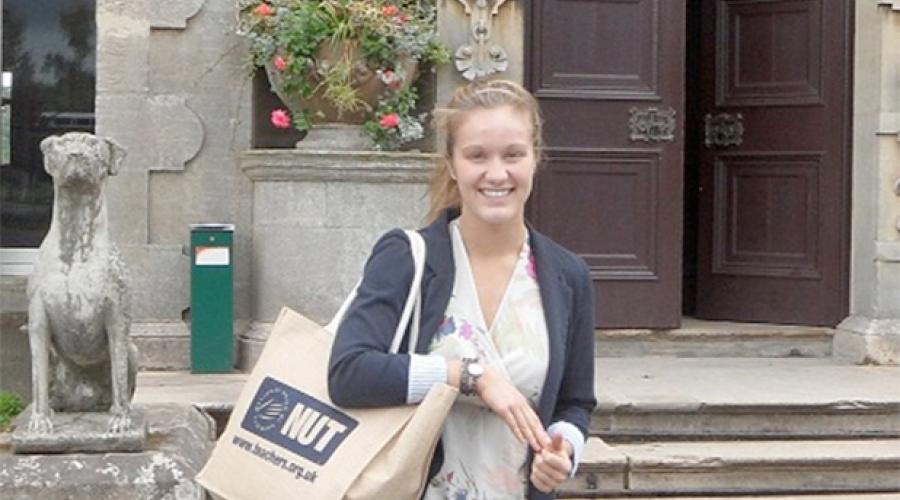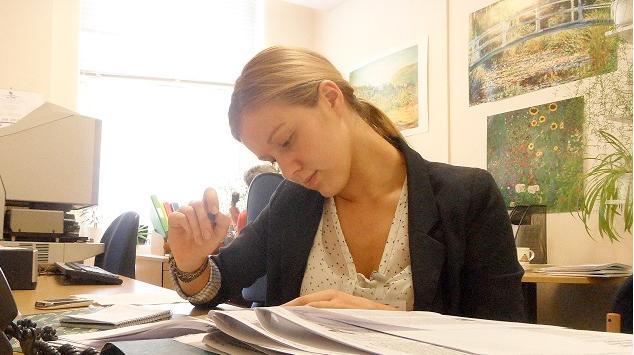
Chyanne Eyde
Inspired by an admissions brochure’s feature on Randi Weingarten, ’80, President of the American Federation of Teachers, I applied to the ILR School three years ago with the intent of merging my strong interest in education with the school’s focus on organizational behavior and unionism. The independent research project that I was able to conduct, thanks partially to my International Travel Grant, allowed me to closely analyze issues of privatization and unionism in public education.
Over the summer I spent 8-weeks overseas learning about the obstacles facing teacher unions in Europe, mostly focused on the UK. I compared the issues and pressures facing teacher unions in the UK to those in the US. Since the release of the documentary hit, Waiting for Superman, teacher unions in the US have been under particular public scrutiny and oftentimes labeled as the obstacle to education reform. Reform in this sense oftentimes refers to increased evaluations, the use of standardized testing, and the creation of charter schools.
I embarked on my independent research project hoping to better understand how the American charter school movement influenced public education in the UK, and how the unions in the UK are responding. I spent my first two weeks in Brussels, speaking to staff at Education International and at the European Trade Union Institute. Through these organizations I was given a crash course in the structure and issues of education across Eastern Europe. Starting at this broad level gave me context before I focused on the UK.
The remainder of my time was spent in London. Upon my arrival, I was greeted warmly by the National Union of Teachers (NUT), the largest teachers union in the UK. They gave me access to their headquarters and I was able to converse with and interview staff in departments ranging from Communication to Research. In addition, the NUT allowed me to shadow some of their field managers as they traveled to various schools to meet with members. As if that we’re enough, the NUT invited me to attend a three-day training course that is offered to their members when they become union representatives. At this training course I not only learned about the history of the union, as the training course was held in a 19th century manor house that had long belonged to the union, but I also got to hear, uncensored, the concerns and complaints of those members most involved in the union. The conversations that I had with these teachers over dinner and during breaks were informal, but very meaningful. Speaking to these teachers helped keep my thinking grounded and reminded me of the individual nature of every school and classroom.

Through the NUT I made contact with several other unions, including the National Association of Schoolmasters Union of Women Teachers, the Association of Teachers and Lecturers, and the National Association of Head Teachers. The UK has a wide range of unions representing educational professionals, so it was pivotal to be able to interview individuals from several.
Even more important, though, were my conversations with individuals involved in the move towards “privatized” education in the UK. In the last two years, the UK has seen more than half of secondary schools convert to “academy” status, meaning they are not controlled by a local authority and are instead overseen directly by the national government. Some of these academies are run by operators who oversee multiple schools, and are therefore referred to as “academy chains.” In addition, the national government has approved dozens of “free schools”, which are very similar to charter schools in that they are more autonomous in how they allocate money and deliver instruction than traditional public schools. By interviewing staff at the New Schools Network, an organization that advises community members wishing to open free schools, and E-Act, an academy chain, I got to hear a range of perspectives.
I return from my international experience with a deeper understanding of many educational issues and with an increased eagerness to learn more. I am incredibly grateful that my ILR education has led me here and I am thankful to the International Programs Committee for helping to provide me with this opportunity.